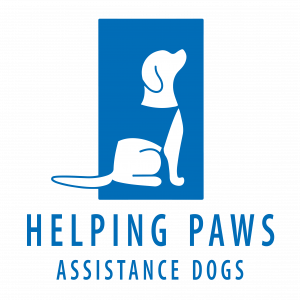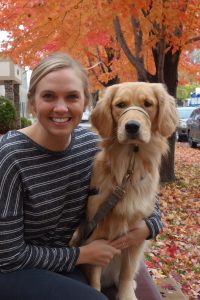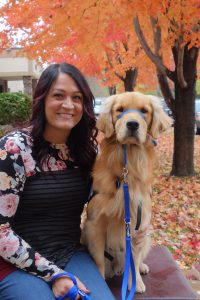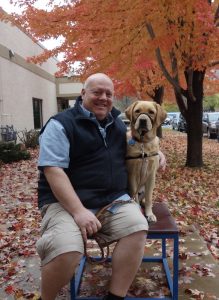Are you eligible to receive a Helping Paws Facility Dog?
For Facility Dogs, the dog’s handler is a working professional in social work, psychotherapy and allied health therapies, such as music therapy, occupational therapy or physical therapy.
For Courthouse Dogs, the dog’s handler is a working professional in the legal field. Examples of suitable handlers include victim advocates, detectives, forensic interviewers, and assistant prosecutors. These professionals have received extensive training from the assistance dog organization about how to handle and care for their dog.
Requirements for Certification of a Facility Dog Team include:
- The dog must complete the Helping Paws two year training curriculum that includes task skills, public training and exposure to various environments and
- A trained, designated person is required to oversee and supervise the activities and care of the dog at all
- The dog must be able to perform basic obedience skills with voice commands and/or hand signals: walk on a loose leash on the right or left side, come, sit, sit stay, drop, drop stay, and retrieve dropped items. A Facility Dog should also have a basic understanding of additional service dog skills such as my lap, snuggle, rise, light, roll over, speak,
- The dog must show appropriate public behavior at the highest level. Inappropriate behaviors such as barking, growling, jumping on or sniffing people are unacceptable and will cause withdrawal of the dog as a Facility
- The dog must be neutered or spayed and be current on all vaccinations. A medical evaluation will be completed to determine that the dog does not have any medical or physical problems that will affect its role as a Facility
- The designated handler and dog must complete and pass the ADI Public Access test. Facility Dogs will be retested at five years and ten years of age to renew their public access.
- Public access for a Facility Dog team is directed toward the team’s work environment. Public access to maintain the dog’s working ability in public situations or to participate in Helping Paws functions is allowed. The handler is expected to use diligence in their use of public access. Public access for the team is not transferable to anyone other than the handler of the
- The dog will be issued a Helping Paws pack or other Helping Paws identification and will receive a Helping Paws ID card. The Helping Paws pack or Helping Paws identification is considered the property of Helping Paws and must be returned to Helping Paws if a Facility Dog is withdrawn from the
- The handler must provide yearly follow up reports to Helping Paws regarding the dog’s function as a Facility
Application Process:
- Helping Paws must receive a letter of interest for a Facility Dog from the applicant before an application packet is sent.
- Helping Paws sends an application packet that includes the Helping Paws Service Facility Application and Family, Friend, Professional, Medical and Mental Health reference forms.
- Applicant submits completed application form and the $100 application fee. Under no circumstances will this application fee be refunded.
- Applicant has the five required reference forms completed and returned to Helping Paws.
- The application file consisting of the application, background check and five references is reviewed.
- Qualified applicants are scheduled for a personal interview.
- After final review by staff, the applicant is notified that Stage 1 of the application process is complete and if eligible applicant moves on to Stage 2 of the application process.
- Applicants may be asked to attend a training session/s with a Helping Paws Facility Dog-In- training so we can further evaluate the applicant’s ability to work with a Facility Dog. Upon completion of these evaluations at a satisfactory level, you have completed the application process and are eligible for a facility dog from Helping Paws.
When declining an application for a Facility Dog, the declination shall promptly be communicated to the applicant without explanation or reason, unless the Director of Programs in his/her discretion determines that some explanation is appropriate.
Letter of Interest Facility Dog
After Application Acceptance:
- The waiting period can vary from several months up to two years.
- Applicant is invited to come to our training center to work with potential matches.
- Applicant is notified of a match and the date of the Team Training course.
- Team Training begins, the applicant and their Facility Dog learn to work together as a team. Prior to beginning Team Training, payment of the $300 equipment fee is required.
- Team Training is completed and the team graduates.
- Graduate works with Helping Paws staff on follow up training. This training occurs in your home, work place, and public locations. Frequency of follow up training is based on individual need for each graduate.
- The graduate team completes the ADI Public Access Test within the first year of placement.
This is a lengthy process and sometimes the waiting period for a dog can be as long as two years. This is due to the length of time necessary to raise and train a Helping Paws Facility Dog. We feel it is very important to find just the right dog to be matched with you.
Previously Approved Applications May Be Removed From Our Waiting List If:
- They have been on our waiting list for over 2 years and we are unable to provide the right match for them.
- Helping Paws is not able to provide routine follow up in their geographic area.
- Staff limitations cause us to reassess our ability to place a Facility Dog with the applicant.
Please Note:
- Applicants and graduates are not required to participate in fundraising or public relation activities in support of Helping Paws.
- All information provided is privileged and will be considered confidential.
- Helping Paws Inc. administers its employment, admissions and training programs in a nondiscriminatory manner and in accordance with applicable state and federal laws. Helping Paws Inc. does not discriminate on the basis of sex, age, race, color, national origin, citizenship status, creed, religious affiliation, marital status, sexual orientation, gender identity or expression, victims of domestic violence or the presence of a medical condition or disability, predisposing genetic characteristics, or any other group protected by law.
Meet some of our recent facility dog graduates. Click on their picture to hear their story.



